Thomas Swann - How are the Mighty fallen
Здесь есть возможность читать онлайн «Thomas Swann - How are the Mighty fallen» весь текст электронной книги совершенно бесплатно (целиком полную версию без сокращений). В некоторых случаях можно слушать аудио, скачать через торрент в формате fb2 и присутствует краткое содержание. Жанр: Фэнтези, на английском языке. Описание произведения, (предисловие) а так же отзывы посетителей доступны на портале библиотеки ЛибКат.
- Название:How are the Mighty fallen
- Автор:
- Жанр:
- Год:неизвестен
- ISBN:нет данных
- Рейтинг книги:4 / 5. Голосов: 1
-
Избранное:Добавить в избранное
- Отзывы:
-
Ваша оценка:
- 80
- 1
- 2
- 3
- 4
- 5
How are the Mighty fallen: краткое содержание, описание и аннотация
Предлагаем к чтению аннотацию, описание, краткое содержание или предисловие (зависит от того, что написал сам автор книги «How are the Mighty fallen»). Если вы не нашли необходимую информацию о книге — напишите в комментариях, мы постараемся отыскать её.
How are the Mighty fallen — читать онлайн бесплатно полную книгу (весь текст) целиком
Ниже представлен текст книги, разбитый по страницам. Система сохранения места последней прочитанной страницы, позволяет с удобством читать онлайн бесплатно книгу «How are the Mighty fallen», без необходимости каждый раз заново искать на чём Вы остановились. Поставьте закладку, и сможете в любой момент перейти на страницу, на которой закончили чтение.
Интервал:
Закладка:
“I will if you give me a push. I had a lot of practice when I was a boy. My parents would come here to Elah in the spring-we brought a tent to sleep in-but Michal and I built a house in this tree. I must have been ten at the time.” He paused and said with surprise, “I was happy then. It was before Rizpah came.” He looked searchingly into David’s face. “It’s come back, you know.”
“What, Jonathan?”
“Feeling ten and happy.”
“Those things never go away. They just hide until somebody uncovers them.” David himself had been a happy boy and a happy, if sometimes restless, youth. He had liked his brothers; he had loved his parents, however foolish their ways; and always, among the solitary hills, he could compose a psalm or plan a battle. Still, he knew how it must have been for Jonathan, who had to be a prince and command a thousand men and please a well-intentioned but misunderstanding father whom he truly loved and, worst of all, endure his mother’s shame and recognize Rizpah in her place at court.
“Ten was hidden in me all this time, till you uncovered it, like a toy-like a clay cart pulled by a donkey-which a child played with before the Flood.”
“Climb,” said David, pushing him up the trunk, “well uncover it together,” and soon they were in the house, which Jonathan and Michal had built to withstand many weathers: round-built, constructed of limb and clay laboriously carried from the ground, with large windows, so that the wind could sweep through them without wrecking the walls. The thatched roof had departed with forgotten winters, but the single room had held tenaciously to its furnishings: a portable hearth, a three-legged stool, a drinking cup with a handle like a snake.
“The couch is gone,” said Jonathan as if he were lamenting a lost friend. “Its feet were the paws of a bear. I carved them myself from cedar wood.”
“But the floor is a couch; it’s soft with leaves.”
“We used to play that we were king and queen,” said Jonathan, “and this was our summer palace, where we got away from the cares of the capital. The sparrows were our subjects. You see, they’re still here. Do you like sparrows, David?”
“Better than phoenixes!”
“So do I. Their feathers are dull and their voices plain, but they generally find something to sing about.”
“They’re just talking, Jonathan,” said David, the musician, “but I expect they find a lot of interesting things to say.” A sudden sadness chilled him like the trickle of air from a deep well. Happiness is a sparrow, he thought, tenacious but brief and frail. He knew that his future would shrill with clashing eagles, with too many loves and loyalties and treacheries, and that he would never again be a simple shepherd or an armor-bearer who could climb a tree with Jonathan.
“You’ll be a king one day, Jonathan. And doubtless you’ll marry a princess from Egypt and forget all about me.”
“You know I will never marry, David.”
“Why not? It’ll be a marriage of state. You don’t have to love the princess. You want a son, don’t you?”
“Twins,” said Jonathan. “With red hair. But wanting isn’t enough. At least I have my little brother, Ishbaal. Saul ignores him, so I have a chance to act like a father. Do you have to marry?” The question held its own wistful answer. An unmarried adult Israelite was as rare as manna after the hot melting sun of noon.
“I expect I shall. But it will have nothing to do with what I feel for you.”
“Then you should marry my sister Michal. She’s already in love with you, and she could help you with my father. He never seems to get angry with her. What’s more you could make her happy. You wouldn’t want my other sister, Merab. She’s a scold.”
“I don’t want to marry anyone for a long time,” said David.
Jonathan took his hand and spread the fingers-the large strong fingers of a shepherd-and smiled as he looked into the palm. “You had better start soon. If I’m counting right, I see nine wives and eighteen concubines in your future.” He turned suddenly serious. “And I think I see an army… a war… and a throne.”
“And you’re with me?”
“Part of the way. Then we’re separated. Then-I don't know.”
“You see death, don't you?” David persisted.
“Not yours, David. I see many years for you.”
“Yours then?”
“Who believes in palmistry anyway, except the Babylonians?”
“And the Babylonians are being swallowed up by the Assyrians, who don’t believe in anything.” He patted Jonathan’s shoulder. “Rest now,” he said. “Lie down on the leaves. I think you’ll find them more comfortable than your lost couch.”
Jonathan obeyed the command, but with, a curious resignation, like a soldier going to a war from which he will never return. He looked at David with wide, solemn eyes.
David knelt beside him and kissed his cheek.
“It is the sin of Sodom,” said Jonathan, still as a fallen image.
“Who says such a ridiculous thing?”
“My father. Samuel. Everybody except my mother and you.”
“And who do you love best in the world?”
“You first. Then my mother.”
“Well then, listen to us. A sin is when you hurt people. Are you afraid I’m going to hurt you?”
“I could never be afraid of you, David. It seemed I was always afraid until you came, though I couldn’t admit it At Micnmash when Nathan and I attacked the Philistines, I was terrified, but I had to be strong for him. And because of my father.”
“And I was terrified of Goliath. It was that single eye, I think. It never bunked. It just stared and stared and almost hypnotized me. What is courage without fear? It’s nothing but foolhardiness. We’re not fools, either of us.”
For answer, Jonathan smiled and opened his arms, and David remembered watching Ahinoam, alone in a forest glade, open her arms to Ashtoreth and pray that the lovely and the loveless should find love. He entered Jonathan’s embrace and seemed at last to know the fullness of the sea, which had tantalized him with fitful flickers, an image, a scent, some words in a song; for he entered a world where dolphins snorted in leaping multitudes and Sirens combed their tresses with combs of coral; and then they were under the sea, he and Jonathan, and the leaves of the oak tree were fathoms of cushioning water, and they swam into a cave where clumsy, amiable crabs brought gifts of amber between their pincers and a friendly octopus arranged them a couch of seaweed and sea anemones.
Jonathan held him with a wild urgency, meeting mood for mood, making of touch a language more articulate than song, and in that ancient oak tree the eternal Ashtoreth was honored more richly than by prayer or sacrifice…
“Sleep now, Jonathan, and I'll keep watch.”
“ ‘Yea, though I walk through the valley of the shadow of death, I will fear no evil; for thou art with me…’ You wrote that, David, didn’t you?”
“Yes, Jonathan. In a way, I wrote it for you.” He had written a song which men would always sing, in the valley or on the mountaintop. He had fought and killed a giant. He had liked a hundred girls and he knew that he would love a score of women, a little, for a little while, and beget children beyond number, but that he would never love anyone, neither man nor woman, as he loved Jonathan…
“I will find you food while you sleep.”
“Don’t leave me, David.”
“Not until you sleep.”
David watched the golden lashes extinguish the green eyes, the perfect features lose their flush-it was like the extinguishing of a rare alabaster lamp from Egypt, and curiously painful to watch-and then he crept from the tree. He did not wish to return to the camp. He could not endure exchanging pleasantries with the soldiers or even encountering Ahinoam; and to meet Saul would remind him of Yahweh instead of Ashtoreth. Being a shepherd, however, he knew that the Vale of Elan, riotous with fruits and flowers ahead of their time, had been called the Garden of Eden. He stripped to his loincloth and made of his tunic a basket for carob nuts, black berries, and wild pears; he wrapped a honeycomb in the huge trumpetlike calyxes of the mulucella flowers; he cupped water in a scarlet buttercup; and returned three times to the tree to carry his banquet to Jonathan.
Читать дальшеИнтервал:
Закладка:
Похожие книги на «How are the Mighty fallen»
Представляем Вашему вниманию похожие книги на «How are the Mighty fallen» списком для выбора. Мы отобрали схожую по названию и смыслу литературу в надежде предоставить читателям больше вариантов отыскать новые, интересные, ещё непрочитанные произведения.
Обсуждение, отзывы о книге «How are the Mighty fallen» и просто собственные мнения читателей. Оставьте ваши комментарии, напишите, что Вы думаете о произведении, его смысле или главных героях. Укажите что конкретно понравилось, а что нет, и почему Вы так считаете.












